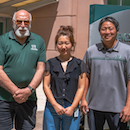A tiny molecule called a nanobody may succeed where today’s cancer drugs often fail, according to University of Hawaiʻi at Mānoa researcher Stefan Moisyadi, who has been refining the concept for nearly a decade.
“Antibodies won the Nobel Prize for immunotherapy,” said Moisyadi, a scientist at the Yanagimachi Institute for Biogenesis Research at the John A. Burns School of Medicine (JABSOM). “They work in some cancers, but not all. In colorectal cancer, they hardly work at all. But when we used nanobodies, bingo, it worked.”
The study, published in eGastroenterology, shows how Moisyadi and his team from JABSOM, the UH Cancer Center, and the College of Tropical Agriculture and Human Resilience used mRNA (messenger ribonucleic acid) to make the body produce nanobodies that block PD-L1—a molecule that helps tumors hide from the immune system. By stopping PD-L1, nanobodies allow immune cells to recognize and attack cancer.
Smaller, stronger and more affordable
Nanobodies are about one-tenth the size of regular antibodies, cheaper to make, and more resilient under stress, according to the research.
“They don’t trigger an immune response in the patient,” Moisyadi said. “They penetrate better because they’re small. They can even refold back to their original shape when conditions improve. Basically, they’re indestructible—they work much better and they’re cheaper.”
Basically, they’re indestructible—they work much better and they’re cheaper.
—Stefan Moisyadi
While traditional antibody treatments can cost patients more than $200,000 a year, nanobody therapy—delivered as mRNA, similar to the COVID-19 vaccines—could cost only a fraction of that, making it far more accessible to patients.
“People can’t afford antibody treatments,” Moisyadi said. “Here we make an RNA version. The patient’s own cells turn it into a protein… It goes into the circulation, finds the tumor, and blocks PD-L1.”
In mouse studies, the treatment cut tumor growth by about 50%—a major result for a cancer that rarely responds to immunotherapy.
Now collaborating with the University of Maryland, Baltimore County, Moisyadi hopes to see this breakthrough continue growing from its roots in Hawaiʻi.
“This works,” he said. “We have the chance to be on the cutting edge. We need to have leaders’ buy-in because everyone here is still focused on antibodies.”
Read more at JABSOM
